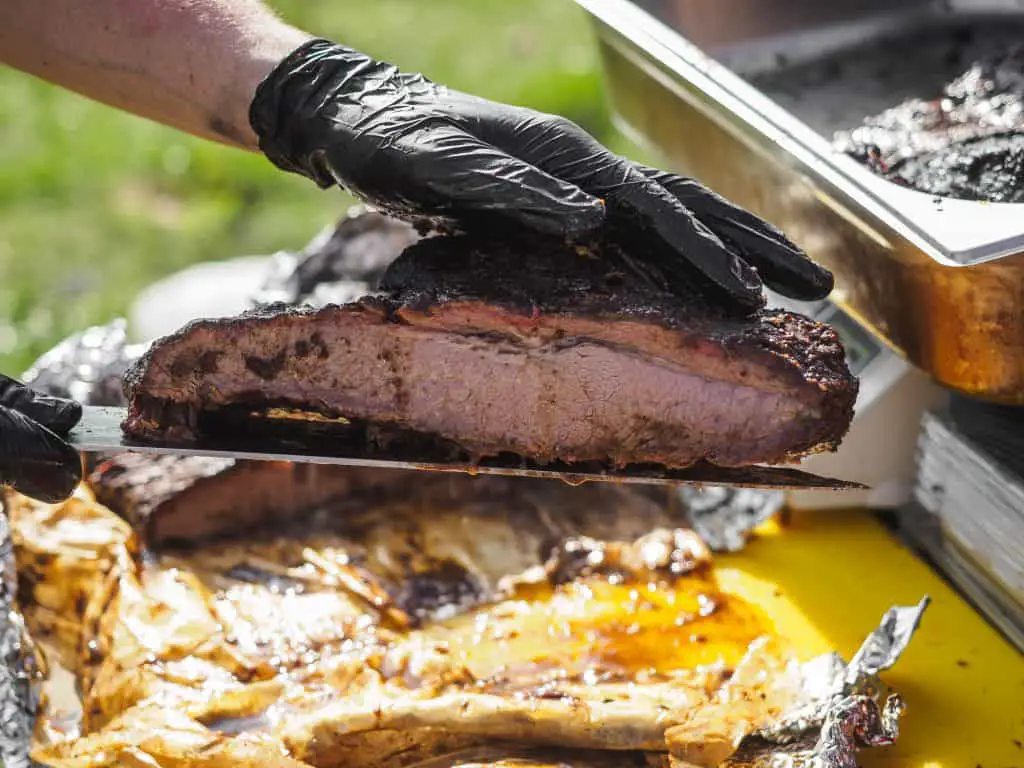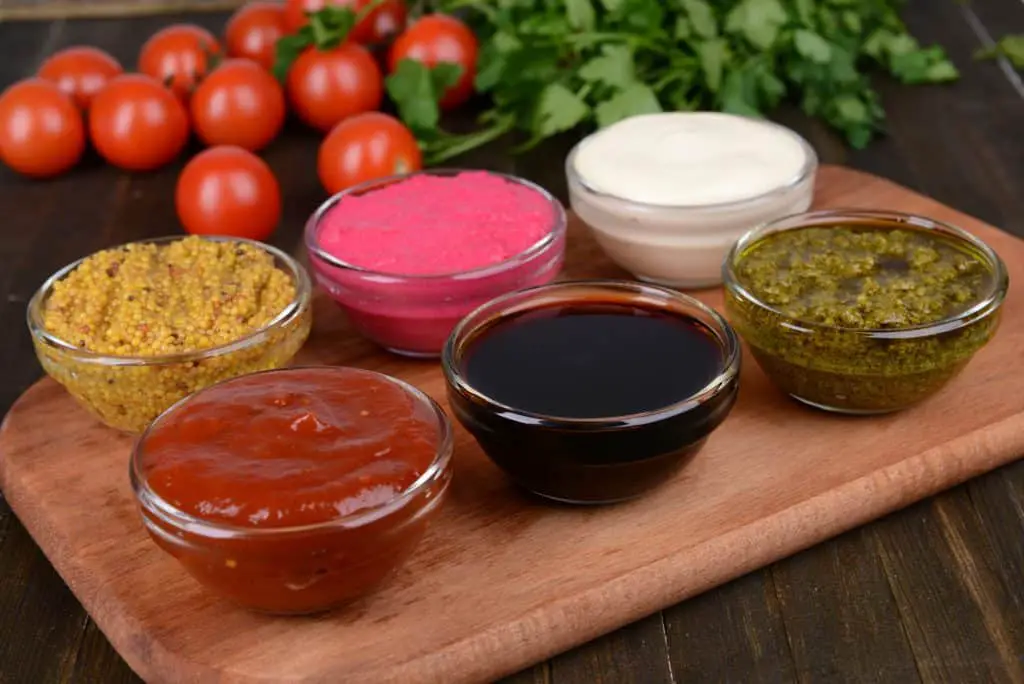While commercial spice rubs can excite the taste buds and create a beautiful black or mahogany bark, too much can lead to an excessively salty brisket.
Although you can’t go back in time and recook it, you can still fix salty brisket once it’s cooked. Here are a few tips you can use to reduce the saltiness overall, and how you can avoid a salty brisket in the future!
Can You Fix Salty Brisket?
To fix salty brisket you can choose to pair it with a sweet, spicy, or vinegar-based sauce or serve it with unsalty side dishes to balance out the flavors. The exterior of the meat where the rub or seasoning is will always be more intense than the inside, so you can always remove a bit of the bark to make it taste less salty.
Beef brisket by itself is so flavorful and if done right it barely needs any seasoning at all. Next time you can adjust how much rub you use or lower the amount of salt in your seasoning to no more than ½ teaspoon of salt per pound of raw brisket.
What Makes Brisket Too Salty?

The majority of commercially made brisket rubs that you buy from the store or online have a high salt content. Although they help add beautiful color to the bark and bring out the flavor in the meat, they have a tendency to overpower the natural flavors of the brisket with too much salt.
However, flavor is all about balance. If you choose to use a commercial rub (because who doesn’t love a nice flavorsome rub), then just be sure to control the salt content of all other steps in the preparation and serving of the brisket.
This means if you’re using a rub with salt in it already, you may wish to avoid salt in any other of the brine, marinade, injection, or sauce you add. Alternatively, you can actually use a rub with no salt and add the salt yourself separately, controlling exactly how much salt is on the brisket.
So, when you cook your brisket keep in mind that you can always add more salt later, but you can’t remove what you’ve already added.
How Much Seasoning/Rub Should You Use For Brisket?
You shouldn’t need more than 1/2 teaspoon of salt per pound when you season the brisket. To make a traditional Texas brisket rub simply mix 1 part kosher salt with 1 part black pepper, each at ½ teaspoon per pound of raw brisket.
The guide of ½ teaspoon of salt per pound of brisket can be followed even if you are using a commercial rub. Knowing that half a teaspoon of salt contains 1162.5mg of sodium, you can check the sodium content of your rub and be sure to add no more than 1162.5mg of sodium per pound of brisket!
Although this is getting a bit technical if you want to keep it simple just use your dry rub a bit more conservatively. In most cases, one light layering of dry rub across the whole brisket will be within limits and won’t cause an overly salty taste. Remember, you don’t want to ruin the true, rich taste of the brisket.
To be safe, even if you don’t think that you’ve seasoned the meat enough, start off sparingly, and give yourself a frame of reference for next time. This is the best way to learn how a new rub or seasoning mix influences the flavor — without causing a salty brisket.
Brining Brisket
Some barbecue enthusiasts swear by brining their brisket in a wet brine of salt and sugar. Although it can help the meat stay moist, tender, and savory, it can also increase the salt levels in the brisket as the brine penetrates into the meat.
The same goes for when you are dry brining your brisket. with a dry brine, you are literally rubbing salt all over the brisket for 2-24 hours. If you do choose to brine your brisket, balance out the salt content by adding less to the rub or using a rub without salt at all. In addition to making the brisket salty, if you brine it too long it can change the texture and more easily cause a tough brisket too.
Brining brisket is much more common when you’re making corned beef. Corned beef brisket is a salt-cured brisket, which is naturally heavily salted due to this process. If you are making corn beef, then you simply reduce the amount of salt in the curing process by half to reduce the overall saltiness.
Using A Savoury Binder
Using a binder is completely up to you and your preference for the taste and texture of the meat.
However, common binders like mustard and ketchup often contain high levels of salt. If you’re already using a salt-heavy rub like most commercial dry rubs then you may want to go for a nonsalty binder like olive oil or go without a binder at all. Using too much of a binder and rub can also stop the smoke ring developing on your brisket.
How To Fix Salty Brisket
If your brisket is done already and you’ve found out it’s a bit too salty for your liking you still have a few options to salvage the beautiful natural taste of the brisket. Recalling that the exterior of the bark of the brisket will always be the saltiest, it’s best to sample a proper slice first as this will give the best balance of flavor.
Once you’ve assessed the flavor, you can effectively fix salty brisket by pairing it with a spicy or sweet sauce or serving it with complementary sides like coleslaw or other unsalty dishes. If worst comes to worst, you can cut your losses and remove some of the bark to reduce the saltiness.
Here is everything you can do to fix salty brisket once it’s already been cooked, whether its a smoked brisket, or cooked in the instant pot or slow cooker.
Assess The Damages
First, it’s always important to assess just how salty your brisket is. Before you assume that the entire brisket is too salty, take a bite from a slice that’s been taken from the center, as it will give you the most balanced sample.
It’s possible that the bark or exterior of the brisket simply contains too much salt, but the inside is perfectly balanced. If this is the case then serving properly cut thin slices may not be too salty after all. If the entire brisket is just too salty then move on to another option.
Use A Spicy, Sweet, Or Vinegar-Based Sauce

When it comes to seasonings there are the four ‘s’. Savory, sweet, spicy, & spices + herbs. If you’ve got yourself an overly salty brisket then the best way you can balance the flavors is by adding more of one or more of the other flavors.
Although a good brisket doesn’t need a drop of sauce on it, if your brisket is salty then I would recommend serving it with a nice spicy chili sauce or a sweet barbecue sauce.
Vinegar-based barbecue sauces also work really well as it cuts through the harsh salt flavor. Try a piece of brisket with each of the sauces you have in your pantry and work out which one pairs well and serve that generously with your brisket to help counteract the saltiness of the brisket.
Take Off Some Of The Bark
While the salt does penetrate the inner layers of the meat, the bark on the outside typically has the highest salt content and most potent salty flavor. Although you may be hesitant to remove some of the bark as it’s arguably the best part, it will help reduce the overall saltiness and make the beef brisket much more palatable.
I would explore all other options before sacrificing the bark, but if you do have to, then I would always recommend slicing off the bottom layer of the brisket as it tends to not be as prominent and beautiful as the top layer.
Make Brisket Sandwiches
Turning your brisket into mouthwatering meat-filled sandwiches can easily hide the saltiness of the meat. Bread, sauce, fresh vegetables and other ingredients add flavor to the dish so your guests won’t focus on the meat alone.
You can completely control the amount of meat per sandwich, as well as the accompanying ingredients to make a well-balanced brisket sandwich. Brisket sandwiches are also a prime choice when you’re serving brisket to large crowds.
Serve It With Unsalted Ingredients
If the meat is too salty, serving it with salty side dishes can cause a sodium overload leaving everyone parched and disgruntled. Well, perhaps not disgruntled — but either way, skip the chips, pretzels, and mashed potato, and serve non-salty dishes like potato salad, coleslaw, or corn on the cob.
Side dishes that contain any cream-based sauces like coleslaw or salads really cut through the salt and make the overall meal much less salty, and much more balanced in flavors and textures.
What To Do To Prevent Salty Brisket Next Time
Ultimately, the best way to fix salty brisket is to prevent it from happening next time. Since commercial rubs are often loaded with salt and savory spices, take a tip from Texas barbecue and keep it simple. If you are conscious of your salt intake, then avoid binders, brining, and dry rubs and make your own seasoning.
Making Your Own Low Salt Brisket Rubs

Making your own rubs is the best way to control exactly how much salt you are adding to your brisket. You can stick to the basics and let the brisket speak for itself by only adding ½ teaspoon of salt and ½ teaspoon of pepper per pound of brisket.
If you want to bring an all-rounded flavor you can add some brown sugar to give the rub a little sweetness. You could add cayenne pepper for a spicy kick. Herbs and garlic powder add an earthy flavor to your rub that balances out the salt and sugar. Paprika gives your rub a nice reddish hue, making it look even more appetizing.
If you are very salt conscious you can actually make a spice rub that contains no salt whatsoever, and still tastes like an authentic rub. Just be aware, the rub does play a huge part in the bark formation on a brisket!
Try some of the different herbs and spices in the pantry to see which combination works for you. If you love mixing flavors, check out this guide of all the essential spices.

